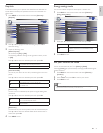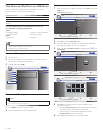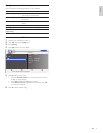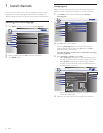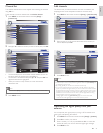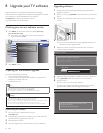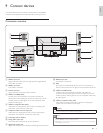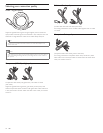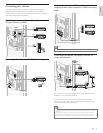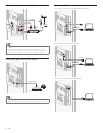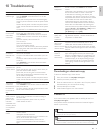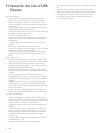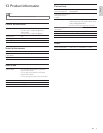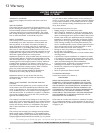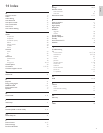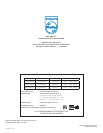32
• Full support of SubClass Code = 06h; SCSI transparent command
set.
• For large USB memory devices, when you are in the Content
Browser, it may take a long time before you can access your fi les.
• When using a USB portable hard disk, and due to the high power
consumption of the hard disk, it is advised to use the external
power supply of the portable hard disk to guarantee proper
working under all conditions.
11 Notes for the Use of USB
Devices
Digital Content Issues
• Only FAT (DOS) formatted (initialized) portable memory is
supported. Errors in this formatting can result in unreadable
content. If such problems appear try to re-format the card. Be
aware that formatting the card will also delete all the content on it
(pictures, music, …).
• Only linear JPEG picture formats are supported. Progressive JPEG
and JPEG2000 encodings are not supported.
• The length of a fi lename or directory name is limited to the length
specifi ed by the FAT16/32 fi le systems.
• Max. levels of nested directories is 19.
• Never use the supported fi le type extensions (.jpg, .jpeg, .mp3) as
extensions for directories as these directories will be treated as
corrupted fi les.
• The MP3 decoder does not support MPEG1 Layer 1 or Layer 2
playback.
• MP3 Pro fi les can be played with normal MP3 quality.
• The access and response time of the content on a device can differ
depending on the type or brand of the device.
• The access and response time of the content on a device will
increase the more unsupported or corrupted fi les are on the
device.
Digital Camera Issues
• If a USB connection between your digital camera and the TV isn’t
working, you can try the solutions below to resolve your problem.
• Make sure your digital camera is switched on and verify if the
confi guration of your digital camera is correct (see the manual of
your digital camera for more information).
• Some digital cameras allow you to switch off the USB interface.
Make sure that the USB interface is switched on before connecting
to the TV.
• If you have a digital camera with only internal memory (no
removable memory) you can try to copy the content manually to
a USB memory device (e.g. Philips KEY product) using a personal
computer.
• Some digital cameras allow you to switch between PTP (Picture
Transfer Protocol) or “PC Link” and USB Mass Storage or “PC
Drive”. Make sure that you select USB Mass Storage or “PC Drive”
on your digital camera.
• If your camera supports different interface settings be sure to try
them one by one or contact the reseller of your camera to fi nd
out the correct setting.
USB Memory Device Issues
• Devices connected to the USB port of your TV must be “Mass
Storage Class” compliant. If your device (digital camera. MP3 player,
portable hard disk, …) is not “Mass Storage Class” compliant it will
not be detected by the content browser of the TV.
• The following subsets of the Mass Storage Class specifi cation are
supported.
• The implementation of the TV is based on the “Universal Serial
Bus Mass Storage Class Specifi cation Overview” (v1.2, June 23,
2003) including all documents referenced by the document. The
document can be found on the USB standardization website
(www.usb.org).
• Full support of the USB Mass Storage Class Bulk-Only Transport
(bInterfaceProtocol = 50h).
• Full support of SubClass Code = 05h; SFF-8070i spec.
EN



